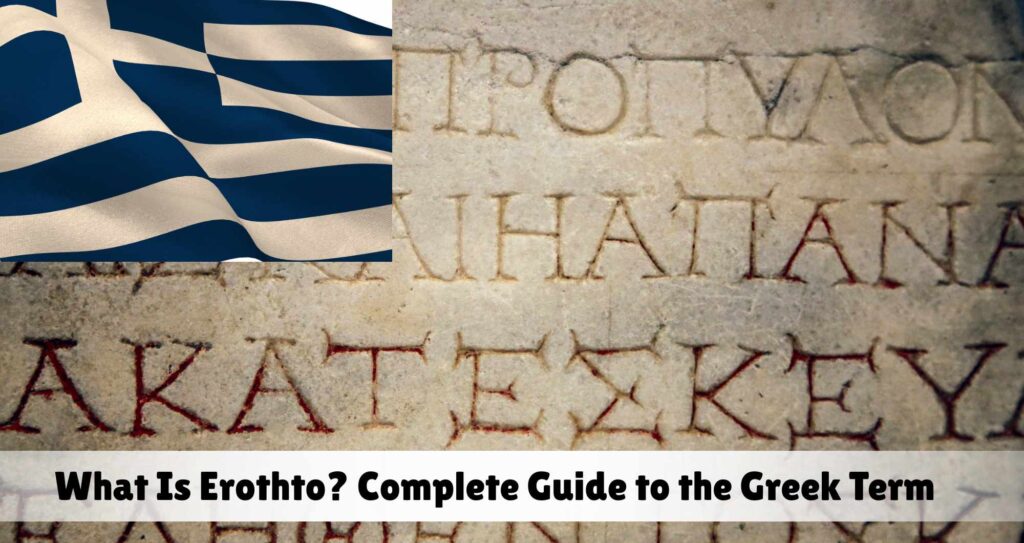Introduction to Erothto
Erothto is a term that carries rich meaning and cultural significance in the Greek language. For those curious about the depths of this expressive word, you’re in for a treat. Whether you’re planning to visit Greece or simply want to expand your linguistic knowledge, understanding erothto can enhance your conversations and connections with native speakers. This complete guide will unravel everything you need to know, from its definition and pronunciation to its contemporary usage in Greek culture. Join us on this fascinating journey into the heart of one of Greece’s intriguing terms!
What Does Erothto Mean?
Erothto is a Greek term that translates to “I ask” in English. It captures the essence of inquiry and seeking knowledge or clarity. This simple yet powerful verb forms the foundation for various expressions and questions in everyday conversations.
At its core, erothto embodies curiosity. When someone uses this word, they express a desire to understand something better or gather information about a specific topic. This can range from casual inquiries to more profound philosophical questions.
In Greek culture, asking questions is highly valued as it reflects an individual’s engagement with their surroundings and willingness to learn from others. Erothto serves as a gateway for dialogue, facilitating meaningful exchanges between people.
The versatility of erothto allows it to be used in countless contexts, whether you’re discussing personal matters or delving into academic subjects. Its straightforward nature makes it accessible for learners who are trying to grasp the nuances of the language.
Moreover, understanding this term provides insight into how Greeks approach communication—often emphasizing openness and exploration through questioning rather than merely accepting statements at face value.
The Greek Origins of Erothto
Erothto is a term deeply rooted in Greek culture and language, reflecting the rich history of expression in this ancient civilization. Its origins can be traced back to classical Greek, where it embodies not just a word but an entire cultural sentiment.
The term itself derives from the verb “erothao,” which means “to ask” or “to inquire.” This connection highlights the importance of communication and curiosity within Greek society. In ancient times, philosophers often emphasized knowledge gained through questioning.
Erothto encapsulates more than mere inquiry; it reflects the social dynamics among individuals. Engaging in dialogue was essential for building relationships and exchanging ideas. The Greeks believed that asking questions led to enlightenment.
Over centuries, Erothto has evolved while maintaining its core meaning. Modern usage still carries that essence of seeking understanding, whether in casual conversation or philosophical discourse.
Today, Erothto remains relevant as part of everyday language in Greece, showcasing how historical roots continue to influence contemporary expression. It serves as a reminder of Greece’s linguistic legacy and its ongoing impact on communication styles around the world.
How to Pronounce Erothto
Pronouncing “erothto” correctly is essential for effective communication in Greek. This term can be a bit tricky due to its unique phonetic structure. The word is composed of several syllables, each carrying distinct sounds that may not exist in other languages.
The first part, “ero,” rhymes with the English word “hero.” It has an open ‘e’ sound followed by a clear ‘r.’ When saying this segment, ensure your tongue lightly touches the roof of your mouth to produce a smooth transition into the next syllable.
Next comes “thto,” which might seem challenging for non-native speakers. Here, you want to emphasize the ‘th’ sound as in “think.” Then follow it with a crisp ‘to.’ Keep your lips relaxed and give attention to articulating both letters distinctly.
When combined, say it fluidly: eh-ROTH-toh. Practice slowing down at first until you’re comfortable with each sound.
Listening and mimicking native speakers can also help refine your pronunciation further. With practice, you’ll find yourself mastering “erothto” effortlessly!
How to Use Erothto in Conversation
Using “erothto” in conversation can add a unique touch to your interactions. It is often used when asking questions related to desires or inquiries about preferences. This makes it particularly effective in both casual and intimate settings.
When addressing friends, you might use “erothto” to explore their interests. For example, if you’re planning an outing, ask them what they would like to do by incorporating the term: “Erothto, τι θέλεις να κάνουμε σήμερα;” (Erothto, what do you want to do today?).
In romantic conversations, the term takes on a deeper meaning. You might pose more personal questions that spark intimacy or connection. For instance: “Erothto, ποιες είναι οι επιθυμίες σου;” (Erothto, what are your desires?). This encourages open dialogue.
Be mindful of the tone and context when using this word. It’s essential that both parties feel comfortable with such discussions. Using it lightly among friends differs from its application in romantic scenarios.
Remember that body language complements verbal communication well. Maintain eye contact and ensure your demeanor matches the depth of your inquiry for a more engaging exchange.
Erothto in Modern Greek Culture
Erothto holds a unique place in modern Greek culture, embodying the essence of inquiry and curiosity. It is often used in everyday conversations to express a desire for knowledge or understanding about various topics. This word reflects the Greeks’ longstanding appreciation for philosophical dialogue and intellectual exploration.
In contemporary settings, Erothto finds its way into social media posts and casual chats among friends. Whether discussing personal experiences or current events, it encourages an open exchange of ideas. Its usage promotes active participation in discussions, making communication more engaging.
Moreover, Erothto has made its mark in educational contexts as well. Students are encouraged to ask questions using this term when seeking clarification from teachers or peers. This practice fosters a learning environment where curiosity is valued and nurtured.
Culturally, Erothto also symbolizes Greece’s rich history of philosophy and questioning traditions that date back to ancient times. It reminds us of the importance of challenging norms and seeking deeper truths.
Through literature and art, themes related to inquiries—often inspired by Erothto—are prevalent across various forms of expression within modern Greek culture today.
Similar Greek Words and Alternatives
When exploring the term erothto, it’s valuable to consider similar Greek words and alternatives. Understanding these terms can enrich your vocabulary and enhance conversations.
One closely related word is “eroti,” which translates to “desire” or “yearning.” This term captures a deeper emotional connection, often used in romantic contexts. It reflects feelings that go beyond mere curiosity.
Another relevant word is “erotismos,” meaning “eroticism.” This encompasses not just physical attraction but also the aesthetic appreciation of beauty and sensuality. It’s frequently used in literature and art discussions.
You might also encounter “epithet,” which refers to an attribute or quality describing a person or thing. While it doesn’t have the same emotional weight as erothto, it can be useful in various conversational scenarios when discussing characteristics.
Lastly, “periergos” means curious or inquisitive. Though its nuance differs from erothto’s connotation of inquiry about someone’s state, it emphasizes an eagerness to learn more about others—another form of engagement worth noting.
Common Mistakes When Using Erothto
When using the term erothto, many people make common mistakes that can lead to misunderstandings. One frequent error is mispronunciation. The correct pronunciation involves emphasizing the “th” sound, similar to how it’s pronounced in “think.” Misplacing this can cause confusion for native speakers.
Another issue arises from context. Some individuals might use erothto when a more casual phrase would be appropriate. Understanding the setting and audience is crucial to ensure effective communication. It’s not always suitable for informal conversations among friends.
Additionally, some learners tend to overuse erothto in their dialogues. While it’s a beautiful word conveying curiosity or inquiry, excessive repetition can diminish its impact and make conversations feel forced or unnatural.
People also struggle with conjugation and tense usage of erothto within sentences. Often, they forget that Greek verbs change form based on who is speaking or writing. Incorrect conjugation may confuse listeners about who is asking the question.
Direct translations from English often miss nuances inherent in Greek expressions like erothto. This leads to awkward phrasing that doesn’t resonate well with native speakers who expect organic language flow.
Using Erothto in Writing and Messages
Using “erothto” in writing and messages can add depth to your communication. This Greek term translates to “ask” or “question,” making it a versatile word for various contexts.
When incorporating “erothto,” consider the tone of your message. If you’re seeking clarity, you might phrase it as, “Erothto what you think about this idea.” It invites a response while maintaining an open dialogue.
In formal writing, using “erothto” demonstrates cultural awareness. You could write something like, “I would like to erothto further details regarding the project timeline.” This approach shows respect for both the language and the recipient’s knowledge.
For casual conversations, feel free to be more relaxed. A simple text saying, “Erothto if we’re still on for dinner tonight?” is friendly and straightforward.
Additionally, when communicating with friends who are familiar with Greek terms or culture, sprinkling “erothto” into your messages can create a playful vibe. It showcases not just linguistic skills but also an appreciation for heritage that might resonate well within personal interactions.
Frequently Asked Questions
Many people have questions about the term erothto, especially those who are new to Greek language and culture. One common query is its exact translation. Erothto often conveys a sense of inquiry or questioning that goes beyond mere curiosity.
Another frequent question revolves around its usage in daily conversations. People want to know when it’s appropriate to use erothto. It can be applied in various contexts, from casual discussions with friends to formal settings where clarity is vital.
Pronunciation also trips up many learners. The phonetic breakdown of erothto can help: it sounds like “eh-ROTH-toh.” Practicing this pronunciation will make you sound more natural when using the word in conversation.
Some wonder if there are synonyms for erothto in Greek. While various terms exist for asking questions, none carry quite the same nuance as erothto does within specific contexts.
Many ask how deeply rooted this term is in modern Greek culture. Erothto serves not just as a linguistic tool but also reflects a cultural emphasis on dialogue and understanding through inquiry.
Conclusion
Erothto is a fascinating term that encapsulates the essence of curiosity and inquiry deeply embedded in Greek culture. Understanding its meaning and origins can enhance your appreciation for the language. The pronunciation may seem daunting at first, but with practice, you’ll find it becomes second nature. Using erothto in conversation opens up avenues for deeper discussions, whether you’re learning Greek or immersing yourself in modern Greek life.
As you navigate through similar words and their nuances, you’ll gain a richer vocabulary to express yourself more fluently. Being aware of common mistakes will help prevent miscommunication and ensure you use erothto appropriately in both spoken language and written contexts.
Arming yourself with this knowledge not only enriches your linguistic skills but also connects you to a cultural heritage that values questioning and understanding. Whether you’re chatting with friends or composing messages, incorporating erothto can add depth to your interactions while celebrating the beauty of the Greek language.


